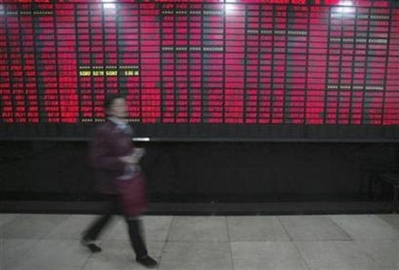Stock market ends stunning year, uncertainties abound
Updated: 2007-12-30 11:25
Shanghai -- This year, the world discovered the Chinese stock market.
Investors in China poured their money into shares like never before, sending the market on a turbulent, stunning, record-breaking ride.
And around the world, people took notice: In February, for the first time ever, a plunge in Chinese stocks helped trigger a global market sell-off, suggesting the potential sway this heretofore ignored market will have in years to come.
China's market quickly recovered and the Shanghai Composite index went on to soar 97 percent this year, making it the world's best-performing major benchmark index.
But the year ahead isn't going to be as rewarding, analysts say, and the volatility will likely continue.
"It was a nice rally," UBS economist Jonathan Anderson wrote in a recent report. The market in 2008 "may not be nearly as exciting."
While many Chinese believe that authorities will to try to keep the markets on an even keel ahead of the Beijing Olympics in August, other risks loom.
Beijing is struggling to keep inflation in check and could continue to raise interest rates. Also, the mortgage crisis in the US has raised the risk of a recession that might sap demand for Chinese exports.
Jason Zhou, 37, is among the legions of Chinese stock investors who were chastened by the market's roller-coaster performance this year.
Zhou, who works for a foreign trade company in Shanghai, bought shares in oil and gas giant PetroChina just after it listed shares on the Shanghai Stock Exchange in November at 43 yuan (US$5.90).
Normally, such elite companies have seen huge, sustained gains after IPOs on domestic bourses.
But PetroChina, whose market value, according to some methods of calculation briefly surpassed US$1 trillion after its local market debut, has fallen back to just above 30 yuan (US$4.10) per share, still nearly twice its IPO price.
Zhou cut his losses and sold when the shares fell to 38 yuan (about US$5.20)
"The loss is not huge, but it's impressive enough," Zhou says. "This was not a pleasant experience."
Neither was the 8.8 percent plunge in the Shanghai index on February 27, which spooked investors around the world and was one of several gut-wrenching drops this year.
In another sign of the Chinese mainland's growing market muscle, Shanghai became the second most popular place for initial public offerings behind New York as companies raised US$48.62 billion through November, according to the World Federation of Exchanges.
That surpassed the US$31.81 billion raised in IPOs in Hong Kong and the US$43.47 billion chalked up in London during the 11-month period, the federation's numbers show. Only the New York Stock Exchange, with US$52.06 billion, had more.
|
|
|
||
|
||
|
|
|
|
